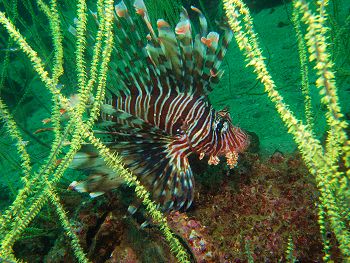17 August 2010 (back to press release archive)
The recent oil spill in the Gulf, now cited as being the biggest oil spills of its kind, has put the spotlight on the plight of the marine life that inhabits the Gulf of Mexico. Protecting ecosystems such as the Gulf of Mexico is critical to the preservation of the planet’s biodiversity, and as evidenced by the ecological repercussions of the oil spill, these delicate ecosystems are highly affected by both human and natural pressures.

Reef life
(c) Biosphere Expeditions
High resolution version of this image available on request from
Aside from contributing to a large part of the planet’s biodiversity, marine ecosystems contribute to the global economy, and so preservation becomes more than just an ecological necessity: it becomes an economic necessity. Dr. Matthias Hammer, founder of a non-profit volunteer wildlife conservation organization called Biosphere Expeditions, is well-acquainted with the challenges that come with attempting to protect some of the world’s most delicate marine environments. For more than 10 years, his organization and its volunteers have worked to protect marine ecosystems.
”Preserving the biodiversity of our biosphere is one of the biggest challenges of our time”, says Dr. Matthias Hammer, “and not just because we have a moral obligation, but also because we are only beginning to realize the trillions of dollars of services provided by a biodiverse biosphere. Just think of the air and water filtering systems of the Amazon and the Atlantic, the protection of hillsides from mudslides by forests, the medicinal compounds that come from marine organisms that cannot be created by even our most advanced chemists or pharmaceutical giants.”
“If you look at persevering biodiversity, you have to consider the marine world,” adds Dr. Hammer. “After all, most of our amazing planet is covered by water and we know very little about what is going on or living under the waves. Pillaging, polluting, and ignoring our oceans is a recipe for disaster. It’s not all doom and gloom, though. Humans are part of the problem, but they are also the key to sustainable solutions. This is why we are keen to involve ordinary people in our conservation projects, get them out there, hands-on, to learn, understand, and become part of the solution.”
Dr. Hammer’s organization pairs the average traveler with real marine biologists to participate in field work that is used in the protection and preservation of marine ecosystems. Their marine life protection projects in Honduras, the Azores, the Musandam Peninsula, and Western Australia, have had an impact in the protection of these natural areas.
Thanks in large part to the work of marine biologists and volunteers, the Musandam Peninsula in Oman for example, has now been put forward as a marine protected area, and there are also moves to make it a UNESCO World Heritage site. Data collected in Honduras, on the Meso-American barrier reef system, the second largest in the world, has been used for improved management procedures of the marine protected area that is already in place there.
For more information, please visit www.biosphere-expeditions.org or email
> back to press release archive
